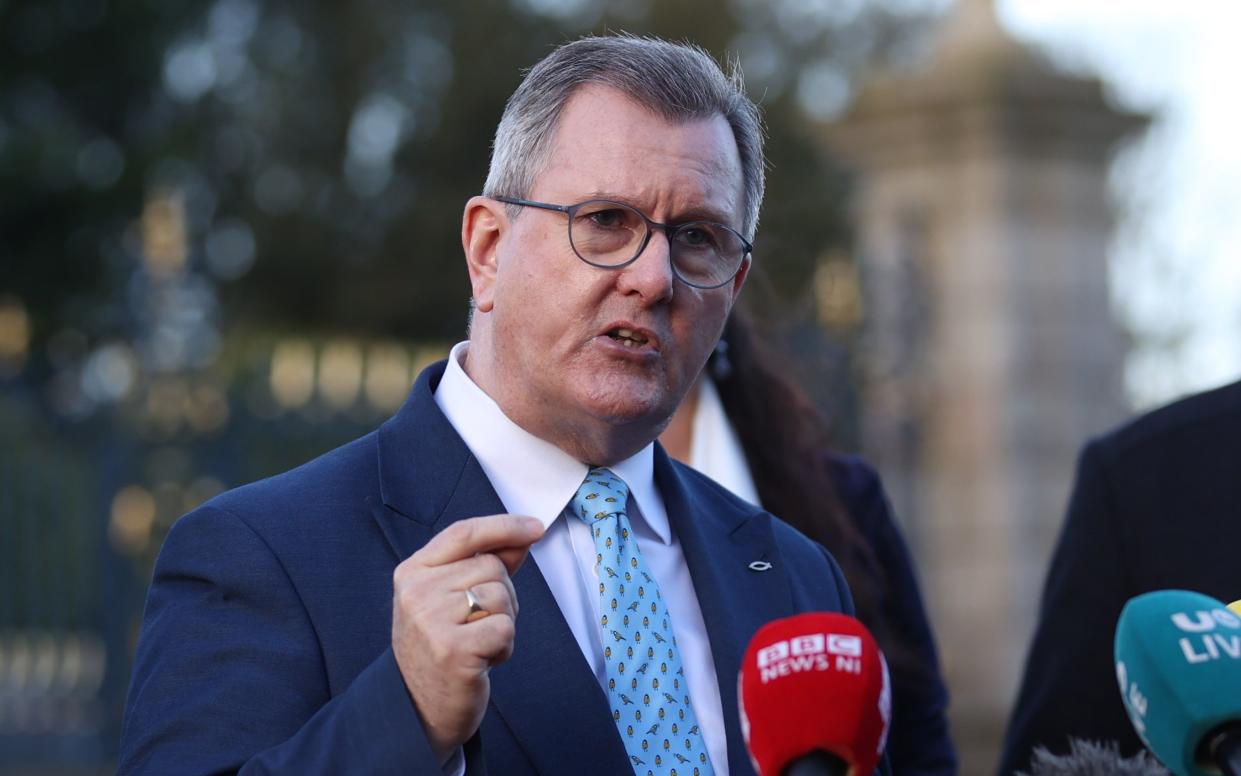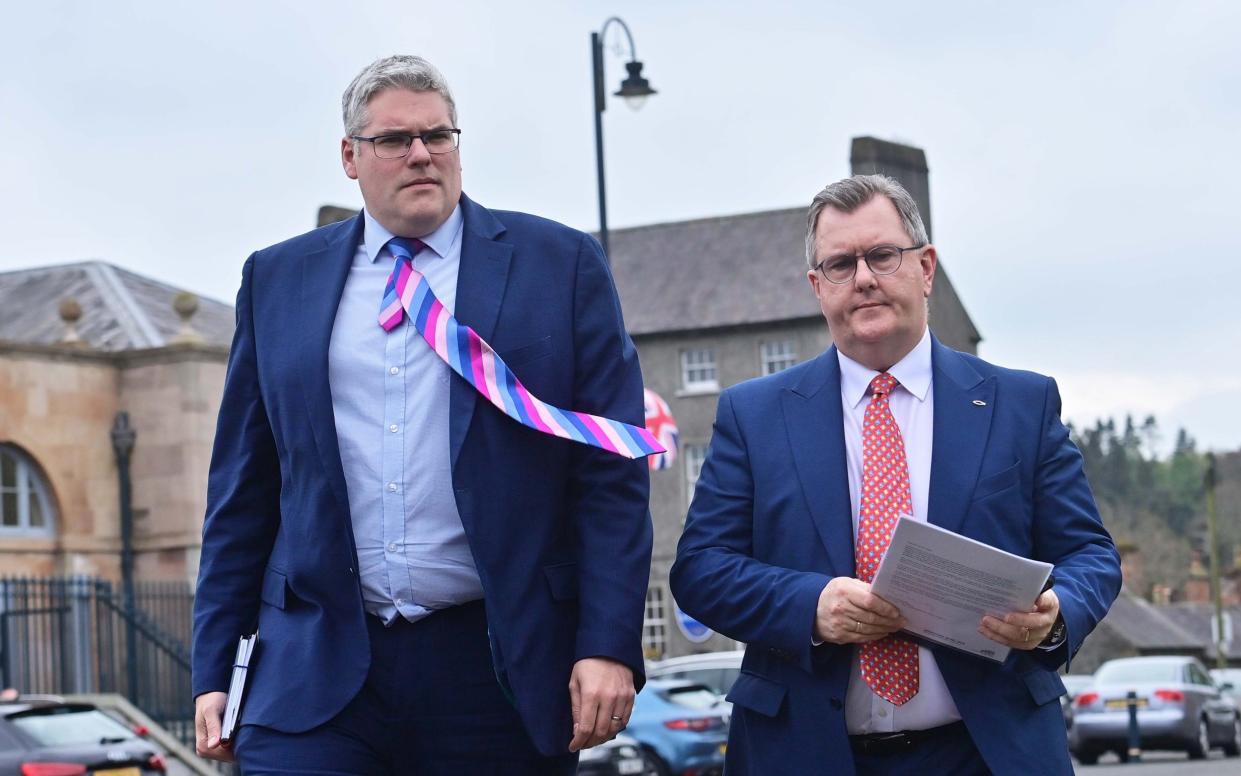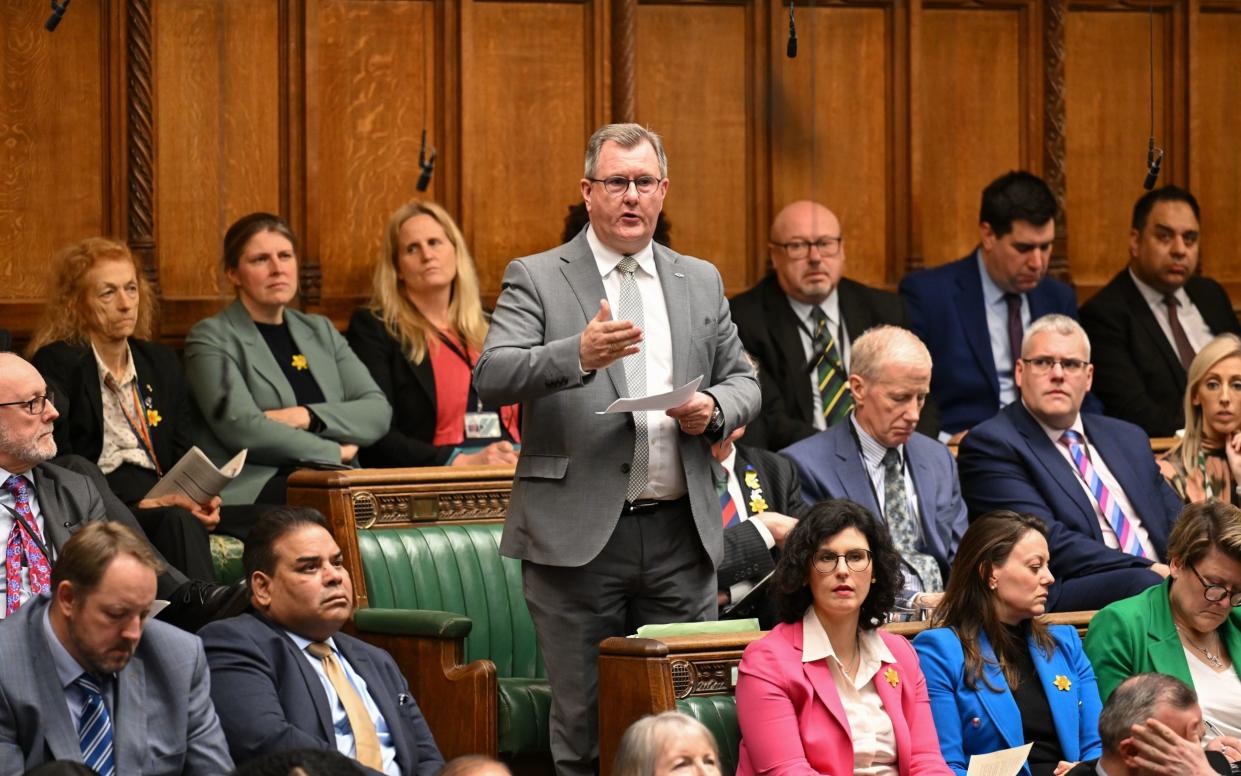Who is Jeffrey Donaldson? Unionist stalwart, ex-British Army soldier and devout Protestant

Perhaps the most poignant blow on a catastrophic Good Friday for Sir Jeffrey Donaldson came when the Orange Order issued a statement late in the day that it had suspended him “pending the outcome of the legal process”.
After all, joining the order as a 16-year-old was the young loyalist’s first political act – it came even before he signed up to the Ulster Unionist Party (UUP).
As the controversies surrounding Orange marches rolled on through the eighties and nineties — Drumcree and other flashpoints – Sir Jeffrey was never far from the centre of the row.
Indeed, the rows were central to the forging of his reputation as a hardline unionist that would eventually take him to the very top of the movement as leader of the Democratic Unionist Party and key arbiter of Northern Ireland’s place in a post-Brexit UK.
And so his suspension from the Orange Order eloquently encapsulates the implosion of a long and consequential political career, after he quit on Friday following charges of historical sexual offences.
The nature of the allegations will be particularly painful for an overtly religious politician who keeps a New Testament in his study and has used his long career as an MP to fight for traditional moral values.
Born in Kilkeel in Co Down in 1962, Sir Jeffrey was introduced to the horror of sectarian violence at a young age when his cousin Sam was killed by the Provisional IRA while serving with the Royal Ulster Constabulary in 1970, the first officer to be blown up in the conflict.
Another cousin, Alex, an RUC chief inspector, was killed in a mortar attack on Newry police station in 1985.

An accomplished school debater, Sir Jeffrey caught the politics bug early.
Determined to do everything in his power to fight republicanism, he joined the British Army’s Ulster Defence Regiment, rising to corporal.
He managed Enoch Powell’s successful election campaigns for the UUP in 1983 and 1986, later serving as personal assistant to the party’s leader James Molyneaux.
These were rough sectarian years in Northern Ireland and Sir Jeffrey was often at the centre of the controversy.
He had a prominent role in the rolling Drumcree conflict over annual loyalist parades. He also took part in a protest against the Anglo-Irish Agreement in 1986, during which an education minister’s car was attacked.
Meanwhile, his support for the blockade of Belfast Airport led to his selection as candidate for Lagan Valley in the 1997 general election, a seat he has held continuously ever since, making him Northern Ireland’s longest-serving MP.
A breaker of political records, he was elected to the Northern Ireland Assembly in 1985 at the age of 22, making him also the youngest person ever to win a seat at Stormont.
Never shy of a fight, Sir Jeffrey had to be removed from the chamber by RUC officers the following year after refusing to follow the Secretary of State for Northern Ireland Tom King’s order to dissolve the assembly.
As the province staggered towards peace in the late nineties, it was the issue of IRA prisoner releases and decommissioning that forced a wedge between the UUP leader Lord Trimble and Sir Jeffrey.
Indeed, despite being on the UUP’s negotiating team for the Good Friday talks, he walked out on the morning of the historic deal in disgust at what he saw as concessions to the IRA.
Eventually, Sir Jeffrey left for the DUP in 2004, alongside Baroness Foster, who went on to become First Minister in 2020.

In the same year, The Daily Telegraph revealed that Sir Jeffrey had repaid £555 in parliamentary expenses which he had spent on pay-to-view films during overnight hotel stays.
In total, he submitted receipts for 86 films, with hotel sources saying that the films he claimed for during 2004 and 2005 were in the highest price category, which would have included the latest blockbusters as well as adult movies.
Sir Jeffrey denied watching any adult or pornographic content.
During his time as an MP Sir Jeffrey was one of 21 MPs to vote against LGBT-inclusive sex and relationship education in English schools. He also opposes same-sex marriage in Northern Ireland.
In 2019 he succeeded Nigel Dodds as leader of the DUP in Westminster. Two years later, he lost to Edwin Poots in the contest to succeed Lady Foster as leader of the national party – but when Poots resigned the following month, Sir Jeffrey was elected unopposed.
The intervening years have been turbulent for the party.
Collapsing power-sharing
In 2022, Sir Jeffrey collapsed the Stormont power-sharing institutions in protest at post-Brexit trading arrangements, which the DUP argued amounted to placing a border in the Irish Sea.
However, after protracted negotiations, the party agreed to return to Stormont in February, following the agreement of a new deal on trade arrangements and a series of measures aimed at providing assurances around Northern Ireland’s constitutional position within the United Kingdom.
Sir Jeffrey lives with his wife Eleanor, with whom he has two children. The couple are renowned Formula One fans and live in a rural house close to where Sir Jeffrey grew up.
His study, which boasts a view of the Mourne Mountains, is littered with political mementos such as a photograph of him taking part in his first Prime Minister’s Questions and a bound copy of his maiden speech.
He also has on display a small New Testament which belonged to a First World War soldier from Lisburn.
“I am chairman of the WW1 Centenary Committee in Northern Ireland so one day a constituent came to my office and asked if I would like to have it,” he told an interviewer.
“They knew of my interest in WW1 and also the importance I place on faith.”


